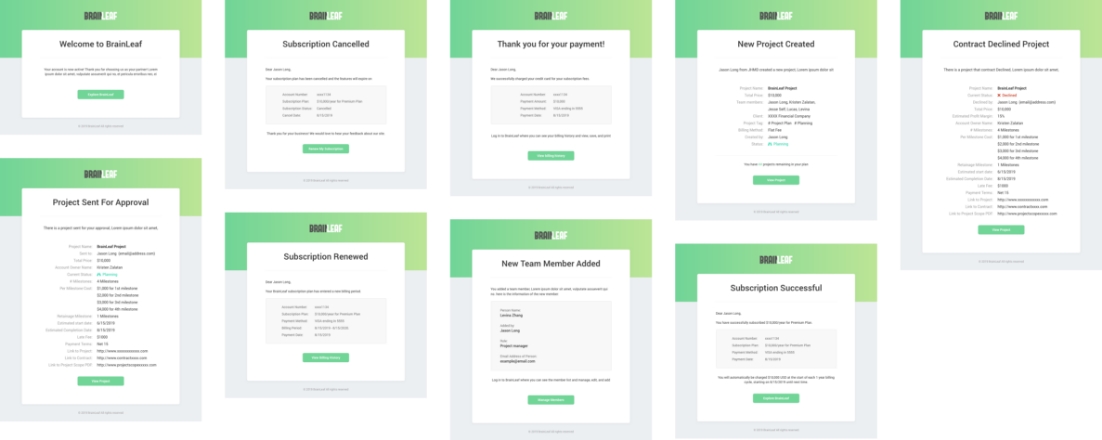brainleaf
BrainLeaf is a SaaS platform that helps digital agencies plan their projects to ensure clients’ expectations are being managed and that projects are profitable.

Years in Operation
Users
Countries
Scope Docs Created
Hours Saved
Project Goals
Improve healthcare business within the US and worldwide by providing insight into the experiences of patients while simultaneously growing the social reputations of the businesses.
What prompted the start of Brainleaf
We were losing money. Projects were constantly being underestimated, tasks or features were being left out, and projects were missing their estimations drastically. We needed a way to ensure projects were estimated correctly, clients understood what they were buying, and we understood what we were going to be building before we started.
The solution was both a method and a system. One of the reasons that projects were not being planned out properly was that it is so time-consuming to start from scratch on scope documents. We needed a way to pull pieces of other projects as well as our estimates for those items and integrate them into new systems quickly.
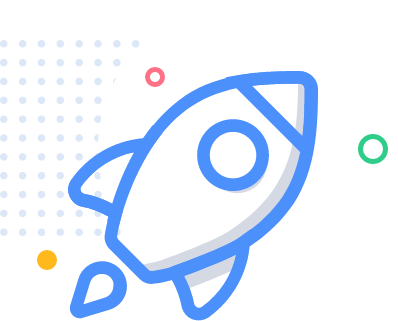
Marketing & Growth
BrainLeaf has grown through SEO, podcasts, and other standard SaaS marketing techniques. We didn’t understand how to grow this kind of business when we first started, so it was a huge learning experience.
Podcasts
We have been featured on a variety of podcasts over the years, and each one has brought us a number of new users.
Email Marketing
We have worked on both outbound and inbound email marketing campaigns within the BrainLeaf system. Outbound was somewhat effective, but given our rankings these days, inbound is very effective at keeping users engaged in the information and systems and moving them from being users to paying users to advocates.
Private Facebook Group
Our private Facebook group “BrainLeaf Engage” is for customers of the BrainLeaf system. In this group, we discuss aspects of marketing, agency management, and users are queried about the value of new products and systems. This has been one of our more successful aspects of the BrainLeaf marketing initiatives.
Youtube
An ongoing Youtube channel that was, at one time, being updated daily has helped drive a lot of traffic and garner a lot of clout in the industry.
Teaser Video
The teaser video was produced to get people interested in the BrainLeaf system. It was released over Facebook and has accumulated a number of views over time. Eventually, this system will be reworked and added to the homepage of BrainLeaf.
Other Marketing Techniques
There are a large number of additional systems that have been implemented to assist in the major aspects of the marketing system noted above. These systems and initiatives include:
- Conversion Rate Optimization With Multivariate And A/B Testing
- Email A/B Testing
- Onboarding A/B Testing
- Iterative Pricing Changes
- Affiliate Marketing
- Social Media Marketing & Growth Campaigns
- Direct Sales And Outreach
Systems
Tech Stack
PHP
Javascript
Typescript
CodeIgniter
Angular
PostgreSQL
Managed Using
Agile Development Method In JIRA & Confluence
Current Team
1 Part-Time Developer
1 Part-Time Designer
1 Part-Time Product Owner
1 Part-Time Support Person
Marketing Websites
The BrainLeaf Marketing Website Is Built Purely In HTML, With The Exception Of The Blog. The Reason For This Is That It Is Easier For Us To Modify The Code Than To Do It With A Website Builder. It Also Enables The System To Load A Lot Faster.
The Website Covers The Major Areas Of A SaaS Including:
Home & Tour
Features
Learning Center
Blog
Pricing
Log-In
Localization
The Website Has Gone Through A Number Of Revisions Over The Years, And Over This Time We Have Created A Great Teaser Video, Blog, And Sales Funnel. More On That In The Marketing Section Though.
Marketing Website

Homepage
- Value proposition
- Call to action to get started
- Tour of features
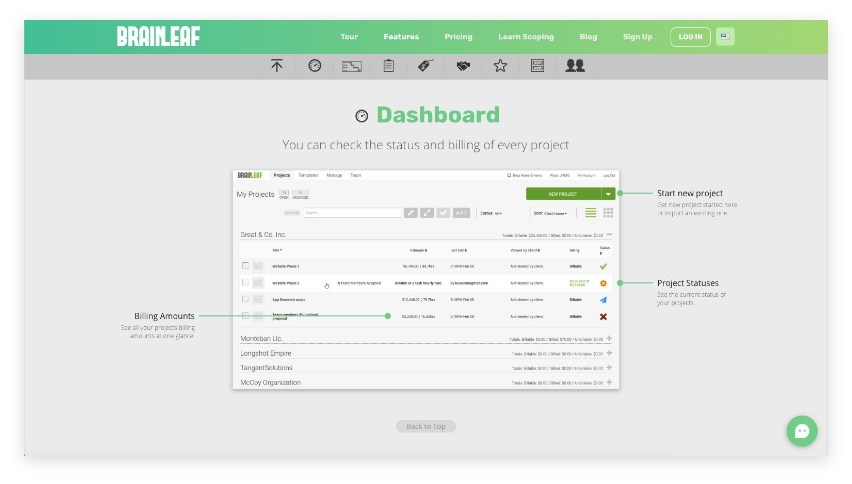
Features
- Explanation of major features

Pricing
- Shows pricing systems
- Features available at each pricing level
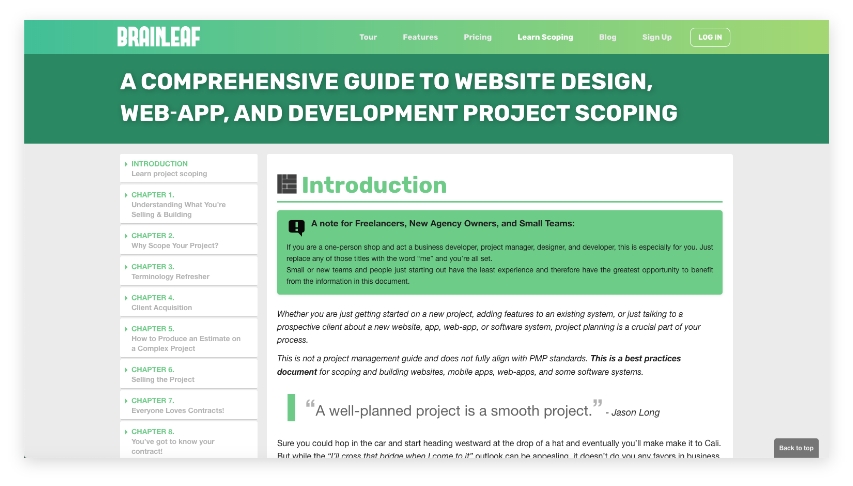
Learn Scoping
Because we have an awareness issue in this market, it was important to inform users extensively about scoping projects and what goes into that process.
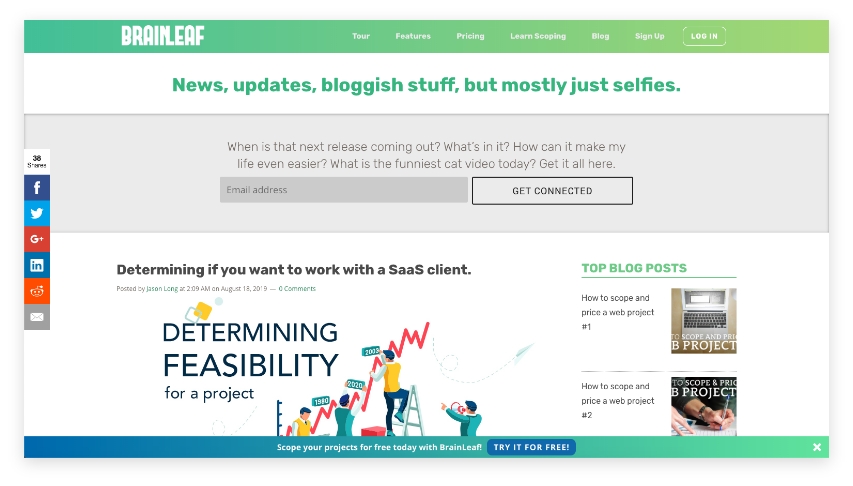
Blog
The blog is the most important lead driver of the website and a fair amount of work has been done on this page to help users easily read and understand the information.

Get Started
Users were signing up without understanding how to use the system before we had time to implement more sophisticated UX to help them along their way, so we implemented a required to watch explainer video before users could sign up. We also gave them a false sense of choice by offering them a demo before they sign up. The trick here is that no one actually signs up for a meeting, but they feel like they can if they want.

Onboarding Process
We have iterated on the onboarding process multiple times. From making users watch a video before they can sign up and requiring a credit card to access the system, to making it simple and free to sign up. The onboarding process now takes users through a series of steps where we learn about who is signing up and enable them to use the basic functionalities of the system at no charge.
Additionally, multiple social logins have been added to the system to enable users to smoothly log in from the areas they are most commonly visiting from.
Application
Dashboard
Once inside the system, and after they have created their first project, users are shown the dashboard system that enables them to see all of their active projects, visit archived projects, start new projects and understand their flow of projects being planned.

Scope Editor
The scope editor is the core feature within the system. This area enables users to quickly scope projects by pulling in templates, assigning hours and expenses, moving large sections of the scope within the document, saving templates, adding tags, enabling and disabling cards, and much more.
From within the scope editor, the user can create a scope of work that would normally take someone hours in just a few minutes.
Once a scope of work document is created, it can be exported to JIRA, Asana, and CSV or shared, printed, reviewed for profitability, and even sent to clients to get a digital signature and approval.
A substantial amount of work has been done on the scope editor to improve performance. The editor these days is operating on Angular and moves quickly and easily to enable users to progress through their documents.

Approval Timeline
This feature allows users to get approval from clients and see their progress through the approval processes.
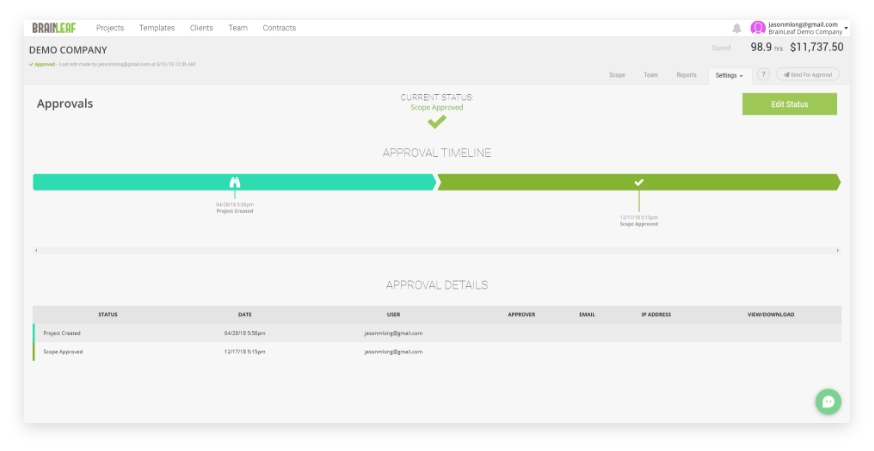
Project Contracts & Signatures
Once a scope of work has been completed, BrainLeaf users can use this feature set to get approvals from clients. The system enables the user to choose pre-entered or custom-added contracts, set up milestones, and get a digital signature from clients, all in one place.
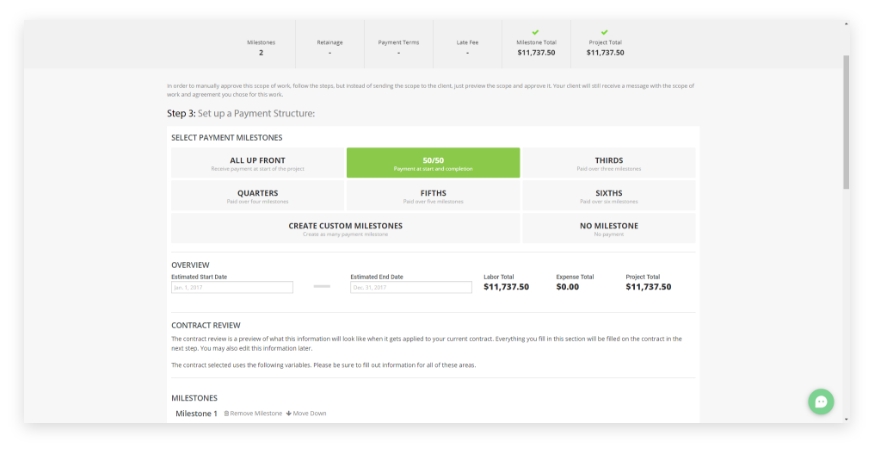
BrainLeaf User Roles and Management Systems
BrainLeaf was built for teams with contractors, so the system enables users to add multiple different levels of users and assign different projects to each of those user types.
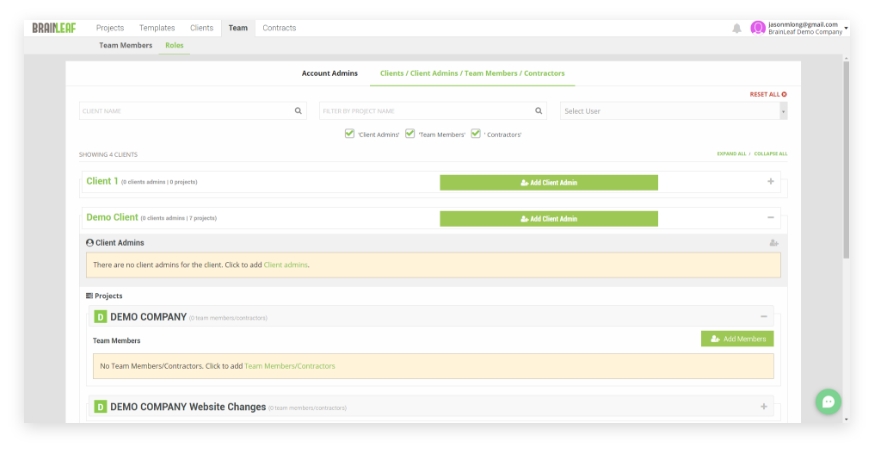
Contracts Management
Users can use pre-loaded BrainLead templates, or upload their own contracts into the system. Contracts also enable for automatic detection of items such as retainage, late fees, and payment terms, which can be edited during the send for approval process.
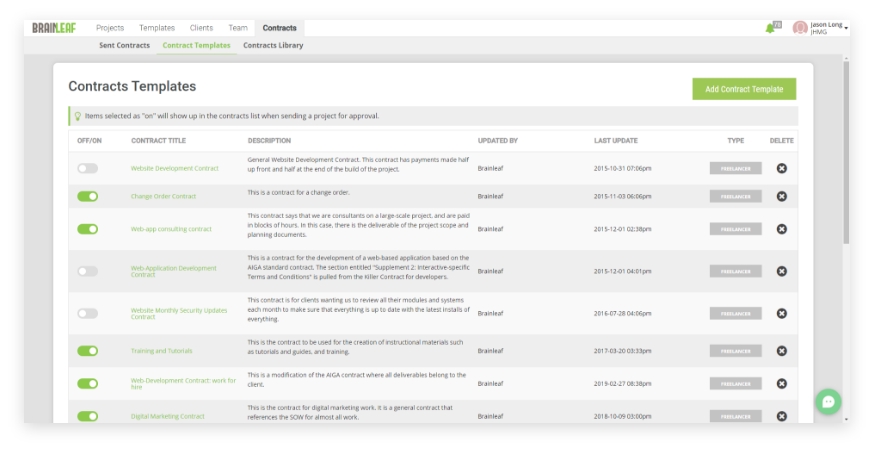
Transactional Emails
The BrainLeaf transactional emails have gone through a few different iterations as well. The transactional emails explain to users billing, user, and account information as well as notifications about what is happening within their account.


Client Management
Users can see a variety of data points on clients accessed within the system. The client management area enables users to manage contacts, see projects, and understand how valuable different client are to their businesses.
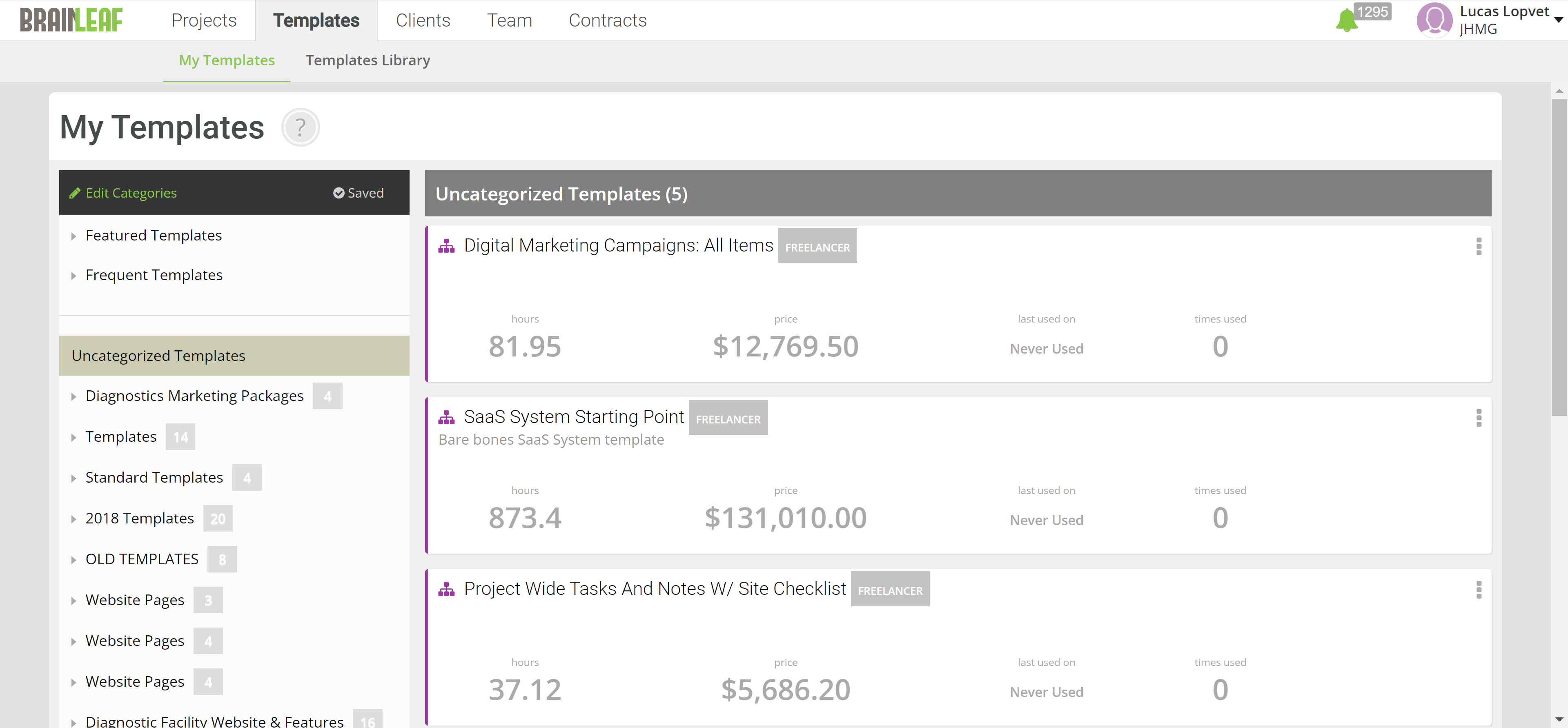
Templates Management
One of the first things new users look for in BrainLeaf is what templates are available. The templates management and template library sections of the system enable users to both manage and order their own templates, but also to see all the templates that are available within the BrainLeaf libraries.
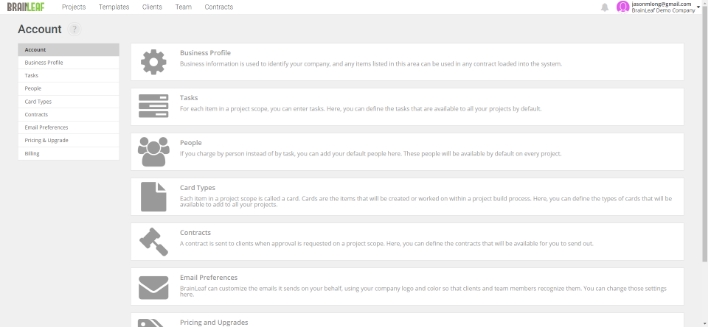
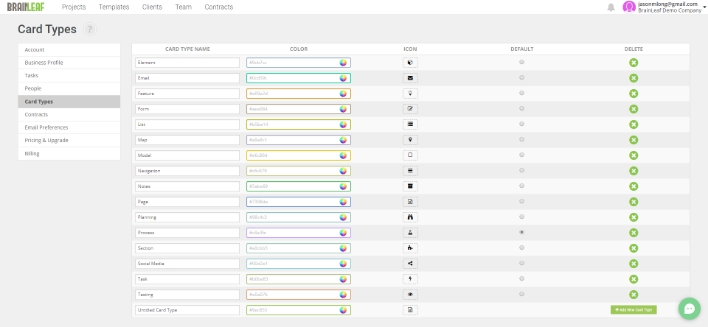
User Account Management
The systems and account management areas of BrainLeaf control subsystems such as:
- Default settings for each major area
- Email settings
- Lists
- Billing
- Upgrades and Editions
This portion of the system is extensive and covers all of the underlying data that a user would need to access.
Editions & Upgrades
When a user signs into the system, they are initially given access only to the most basic templates and are limited on some aspects of functionality. They can also only use one project at a time without upgrading. The system for managing pricing, features accessibility, and access to templates and contracts is critical to helping users understand the value of the system and upgrading their systems.
System Data
When a user initially signs up for the system, they have pre-loaded templates, access to templates and contracts libraries, can see featured templates, and have a variety of other pre-loaded data.
From the systems management area, we enable BrainLeaf admins to manage all this data.
Admin Panel
There are three different major areas of the admin panel system for BrainLeaf. These include:
- User management
- Payments and promotional codes
- System Data such as templates and contracts libraries and default user information
Third-Party Integrated Systems
Third-party integrations are a critical part of almost all SaaS systems. They give access to information that no one system could manage. Within BrainLeaf, we currently have the following 3rd party integrated systems.
- Google Analytics
- Drip.com
- Mandrill
- Lucky Orange
- Google Cloud Services
- Facebook API




